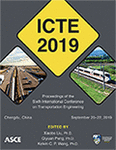Sixth International Conference on Transportation Engineering
Threshold Division of Urban Road Network Traffic State Based on Macroscopic Fundamental Diagram and K-Means Clustering
Publication: ICTE 2019
ABSTRACT
In order to identify the real-time traffic state of the regional road network effectively, this paper proposes a method to determine the thresholds of the selected index corresponding to different traffic states, which combines the macroscopic fundamental diagram (MFD) of the road network with the K-means clustering. Firstly, in order to facilitate real-time control of regional traffic, the number of accumulated vehicles inside the road network is selected as the discriminant index, and the cluster K value is determined according to the data characteristics of MFD and related specifications. Then select the K-means algorithm to cluster the MFD scatter plots to get the range of indicators corresponding to each traffic state. The case study shows that the method can quickly identify the macroscopic traffic state of the road network according to the number of internal vehicles in the road network. Moreover, the difference between the threshold of the indicator obtained by clustering the MFD and the threshold obtained according to the speed of the road network is within 10 veh, which proves the effectiveness of the method. In addition, by comparing and analyzing the index thresholds identified under different control methods, the application value of this method in the evaluation of traffic measures is illustrated.
Get full access to this chapter
View all available purchase options and get full access to this chapter.
ACKNOWLEDGEMENT
This work is supported by National Natural Science Foundation of China (General Program, Grant No. 61873216).
REFERENCES
Beijing Transportation Development Research Center (2010) Beijing local standard "City Road Traffic Congestion Evaluation Index System" Draft for comments.
Courbon, T, and Leclercq, L. (2011). “Cross-comparision of macroscopic fundamental diagram estimation methods.” Procedia-Social andBehavioralSciences, 20,417-426.
Daganzo, C. F. (2007). “Urban gridlock: macroscopic modeling and mitigation approaches.” Transportation Research, Part B (Methodological), 41(1), 0-62.
Geroliminis, N., and Daganzo, C. F. (2007). “Macroscopic Modeling of Traffic in Cities.” The 86th Transportation Research Board Annual Meeting.
Geroliminis, N., and Daganzo, C. F. (2008). “Existence of urban-scale macroscopic fundamental diagrams: some experimental findings.” Transportation Research Part B: Methodological, 42(9), 0-770.
LI, Gangqi (2017). “The Discrimination of Road Network Capacity and Congestion based on Macroscopic Fundamental Diagrams.” China Urban Transportation Planning Annual conference.
LI, Xin (2018). “Study on Regional Road Network Perimeter Control Based on MFD.” Southwest Jiaotong University
MA, Wanjing, and LIAO, Dabin (2014). “Progress and Prospects of Macroscopic Fundamental Diagrams.” Journal of Wuhan University of Technology (Transportation Science & Engineering), 38(06): 1226-1233.
SUN, Jigui, LIU, Jie, and ZHAO, Lianyu (2008). “Clustering Algorithms Research.” Journal of Software, 2008(01): 48-61.
SUN, Ke, LIU, Jie, and WANG, Xueyin (2009). “K Mean Cluster Algorithm with Refined Initial Center Point.” Journal of Shenyang Normal University (Natural Science Edition), 27(04): 448-450.
WANG, Fujian, WEI, Wei, WANG, Dianhai et.al. (2012). “Urban Road Network Traffic State Identification and Monitoring Based on Macroscopic Fundamental Diagram.” The 7th China Intelligent Transportation Annual Meeting.
WANG, Xiaoxuan (2017). “The Partition of Urban Traffic Network and Classification of traffic status Based on Clustering.” Beijing Jiaotong university.
YUE, Yuanyuan, YU, Lei, and ZHU, Lin (2014). “Macroscopic Model for Evaluating Traffic Conditions on the Expressway Based on Speed-Specific VKT Distributions.” Journal of Transportation Systems Engineering and Information Technology, 14(4), 85-92.
ZHU, Lin, YU, Lei, and SONG, Guohua (2012). “MFD-Based Investigation into Macroscopic Traffic Status of Urban Networks and Its Influencing Factors.” Journal of South China University of Technology (Natural Science Edition), 40(11),138-146.
Information & Authors
Information
Published In
ICTE 2019
Pages: 31 - 39
Editors: Xiaobo Liu, Ph.D., Southwest Jiaotong University, Qiyuan Peng, Ph.D., Southwest Jiaotong University, and Kelvin C. P. Wang, Ph.D., Oklahoma State University
ISBN (Online): 978-0-7844-8274-2
Copyright
© 2020 American Society of Civil Engineers.
History
Published online: Jan 13, 2020
Authors
Metrics & Citations
Metrics
Citations
Download citation
If you have the appropriate software installed, you can download article citation data to the citation manager of your choice. Simply select your manager software from the list below and click Download.
